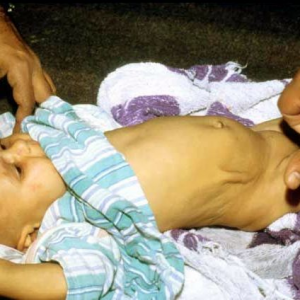Filter by Topics
Frequently Asked Questions
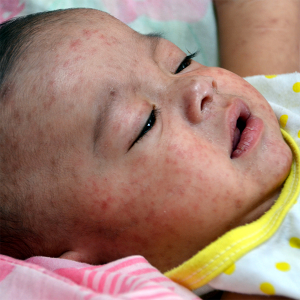 What are the diseases?
Measles is a disease caused by a virus and usually begins with a high fever, cough, runny nose, white spots in the mouth, and watery eyes. A rash with red spots usually starts at the hairline and spreads all over the body. The disease is spread through the air and is very contagious.
Mumps is also caused by a virus and spread from person to person when they cough or sneeze. A person who is sick may have swelling in the glands below their ears, headaches, loss of appetite, or a low-grade fever. Other people may feel like they have a cold or no symptoms at all.
Rubella is also caused by a virus and spread from person to person through the air. Children who have rubella may have a rash on their face, swelling behind their ears, or low-grade fever. Some people may not show any symptoms at all.
What are the diseases?
Measles is a disease caused by a virus and usually begins with a high fever, cough, runny nose, white spots in the mouth, and watery eyes. A rash with red spots usually starts at the hairline and spreads all over the body. The disease is spread through the air and is very contagious.
Mumps is also caused by a virus and spread from person to person when they cough or sneeze. A person who is sick may have swelling in the glands below their ears, headaches, loss of appetite, or a low-grade fever. Other people may feel like they have a cold or no symptoms at all.
Rubella is also caused by a virus and spread from person to person through the air. Children who have rubella may have a rash on their face, swelling behind their ears, or low-grade fever. Some people may not show any symptoms at all.
 Are the diseases common?
Before the vaccine was widely used starting in 1963, there were about 3-4 million cases of measles in the United States each year. There have been over 700 cases so far in 2019, which is the highest number of cases reported since 1994.
In 1963, there were over 212,000 cases of mumps in the United States. In 2012, there were only 229 reported cases. However, there have been multiple outbreaks of a few thousand cases of mumps in recent years.
In 1964-1965, 12.5 million people in the United States had rubella. Today it is very rare with only about 10 cases reported each year.
Are the diseases common?
Before the vaccine was widely used starting in 1963, there were about 3-4 million cases of measles in the United States each year. There have been over 700 cases so far in 2019, which is the highest number of cases reported since 1994.
In 1963, there were over 212,000 cases of mumps in the United States. In 2012, there were only 229 reported cases. However, there have been multiple outbreaks of a few thousand cases of mumps in recent years.
In 1964-1965, 12.5 million people in the United States had rubella. Today it is very rare with only about 10 cases reported each year.
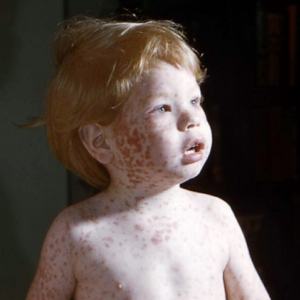 Are the diseases treatable?
There is no specific treatment for measles, mumps, or rubella. Children who get sick should get plenty rest and fluids. They can also take over-the-counter medications to lower their fever.
Can the diseases be deadly/dangerous?
While they are rare, there are complications from measles. Children may have diarrhea, ear infections that can result in hearing loss, pneumonia (infection of the lungs), or encephalitis (infection of the brain). 1 in 1000 children who get the disease will die.
Most cases of mumps are very mild. Rarely, mumps can cause meningitis (infection of the covering of the brain and spinal cord), orchitis (inflammation of the testicles), or deafness.
Cases of rubella in children are also very mild. However, it can lead to birth defects or death in unborn children if a pregnant woman is infected.
Should I get the vaccine?
YES!
When is the vaccine given?
The vaccine is normally given in 2 doses. 1 dose is given 12-15 months and between 4-6 years.
Does the vaccine work?
Yes, 90-95% of people who get 1 dose of the MMR vaccine are protected against measles and rubella.
What are the common side effects of the vaccine?
While it is rare, some people who get the vaccine may have a fever or a rash.
Is the vaccine safe?
YES!
Where can I get more information about the MMR vaccine?
Are the diseases treatable?
There is no specific treatment for measles, mumps, or rubella. Children who get sick should get plenty rest and fluids. They can also take over-the-counter medications to lower their fever.
Can the diseases be deadly/dangerous?
While they are rare, there are complications from measles. Children may have diarrhea, ear infections that can result in hearing loss, pneumonia (infection of the lungs), or encephalitis (infection of the brain). 1 in 1000 children who get the disease will die.
Most cases of mumps are very mild. Rarely, mumps can cause meningitis (infection of the covering of the brain and spinal cord), orchitis (inflammation of the testicles), or deafness.
Cases of rubella in children are also very mild. However, it can lead to birth defects or death in unborn children if a pregnant woman is infected.
Should I get the vaccine?
YES!
When is the vaccine given?
The vaccine is normally given in 2 doses. 1 dose is given 12-15 months and between 4-6 years.
Does the vaccine work?
Yes, 90-95% of people who get 1 dose of the MMR vaccine are protected against measles and rubella.
What are the common side effects of the vaccine?
While it is rare, some people who get the vaccine may have a fever or a rash.
Is the vaccine safe?
YES!
Where can I get more information about the MMR vaccine?
- http://www.immune.org.nz/diseases/measles
- http://www.immune.org.nz/diseases/mumps
- http://www.immune.org.nz/diseases/rubella
- https://www.chop.edu/centers-programs/vaccine-education-center/vaccine-details/measles-mumps-and-rubella-vaccines
- https://www.cdc.gov/measles/about/index.html
- https://www.cdc.gov/mumps/about/index.html
- https://www.cdc.gov/rubella/about/index.html
- http://www.immunize.org/catg.d/p4209.pdf
- http://www.immunize.org/catg.d/p4211.pdf
- http://www.immunize.org/catg.d/p4218.pdf
 What are the diseases?
What are the diseases?
Measles is a disease caused by a virus and usually begins with a high fever, cough, runny nose, white spots in the mouth, and watery eyes. A rash with red spots usually starts at the hairline and spreads all over the body. The disease is spread through the air and is very contagious.
Mumps is also caused by a virus and spread from person to person when they cough or sneeze. A person who is sick may have swelling in the glands below their ears, headaches, loss of appetite, or a low-grade fever. Other people may feel like they have a cold or no symptoms at all.
Rubella is also caused by a virus and spread from person to person through the air. Children who have rubella may have a rash on their face, swelling behind their ears, or low-grade fever. Some people may not show any symptoms at all.
 Are the diseases common?
Are the diseases common?
Before the vaccine was widely used starting in 1963, there were about 3-4 million cases of measles in the United States each year. There have been over 700 cases so far in 2019, which is the highest number of cases reported since 1994.
In 1963, there were over 212,000 cases of mumps in the United States. In 2012, there were only 229 reported cases. However, there have been multiple outbreaks of a few thousand cases of mumps in recent years.
In 1964-1965, 12.5 million people in the United States had rubella. Today it is very rare with only about 10 cases reported each year.
 Are the diseases treatable?
Are the diseases treatable?
There is no specific treatment for measles, mumps, or rubella. Children who get sick should get plenty rest and fluids. They can also take over-the-counter medications to lower their fever.
Can the diseases be deadly/dangerous?
While they are rare, there are complications from measles. Children may have diarrhea, ear infections that can result in hearing loss, pneumonia (infection of the lungs), or encephalitis (infection of the brain). 1 in 1000 children who get the disease will die.
Most cases of mumps are very mild. Rarely, mumps can cause meningitis (infection of the covering of the brain and spinal cord), orchitis (inflammation of the testicles), or deafness.
Cases of rubella in children are also very mild. However, it can lead to birth defects or death in unborn children if a pregnant woman is infected.
Should I get the vaccine?
YES!
When is the vaccine given?
The vaccine is normally given in 2 doses. 1 dose is given 12-15 months and between 4-6 years.
Does the vaccine work?
Yes, 90-95% of people who get 1 dose of the MMR vaccine are protected against measles and rubella.
What are the common side effects of the vaccine?
While it is rare, some people who get the vaccine may have a fever or a rash.
Is the vaccine safe?
YES!
Where can I get more information about the MMR vaccine?
- http://www.immune.org.nz/diseases/measles
- http://www.immune.org.nz/diseases/mumps
- http://www.immune.org.nz/diseases/rubella
- https://www.chop.edu/centers-programs/vaccine-education-center/vaccine-details/measles-mumps-and-rubella-vaccines
- https://www.cdc.gov/measles/about/index.html
- https://www.cdc.gov/mumps/about/index.html
- https://www.cdc.gov/rubella/about/index.html
- http://www.immunize.org/catg.d/p4209.pdf
- http://www.immunize.org/catg.d/p4211.pdf
- http://www.immunize.org/catg.d/p4218.pdf
What are the diseases?
Diphtheria, tetanus, and pertussis are all caused by bacteria that release toxins, or poison, into the body.
Diphtheria can create a thick coating on the back of the throat, making it difficult for a person to breathe and swallow. A child may develop a fever, sore throat, weakness, or swollen glands in the neck. Diphtheria is usually spread through the air when a person coughs or sneezes.
Tetanus causes muscle spasms that can be painful, meaning that a muscle suddenly tenses up and cannot relax. If this happens to muscles in the neck or jaw, a person may not be able to breathe. A person may also have painful muscle stiffness, jerking (seizures), headaches, or a fever. A person can be exposed to the disease if they step on a nail or glass that was lying on the ground since these bacteria live in the soil.
Pertussis, also known as whooping cough, is very contagious and spreads from person to person through coughing, sneezing, or being too close to a person who is sick. For the first week or two, child may look like they have a cold, such as having a runny nose, low-grade fever, or mild cough. Later, the disease makes children cough so hard that they cannot catch their breath, making a “whoop” sound when the try to breathe in again.
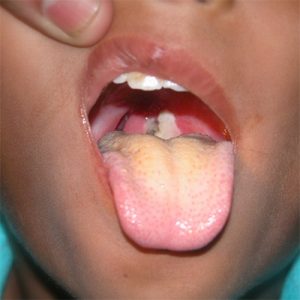 Are the diseases common?
Are the diseases common?
At its peak, about 150,000 cases of diphtheria occurred in the United States every year causing between 13,000-15,000 deaths. The diphtheria vaccine that was first used in the United States in the early 1940s has virtually eliminated the disease. Today, there are fewer than two cases a year.
In the 1940s, there were 500-600 cases of tetanus reported per year and these numbers decreased after the vaccine was introduced. Between 2001 and 2016, only 29 cases were reported per year. Almost all cases of tetanus are in people who have never been vaccinated or who had the vaccine as a child, but did not have a booster dose of the vaccine within the past 10 years.
After the vaccine was introduced in the late 1940s, the number of cases of pertussis (whooping cough) decreased from 200,000 per year to a low of 1,010 cases in 1976. The number of people with pertussis has increased in recent years. In 2017, there were over 18,000 reported cases of pertussis and 13 deaths.
Are the diseases treatable?
Treatment for diphtheria includes an antibiotic to kill the bacteria and a diphtheria antitoxin to stop the poison produced by the bacteria from damaging the body.
There is no cure for tetanus once a person develops symptoms. However if a person may have been exposed to tetanus bacteria, they should go to the hospital so that they can receive medicine to give them the antibodies to fight against the tetanus infection. They can also get medication to help control the muscle spasms.
Pertussis (whooping cough) can be treated with antibiotics. Giving cough medicine probably will not help stop the coughing and is not recommended.
Can the diseases be deadly/dangerous?
Yes, before there was treatment for diphtheria, more than half of people who got the disease died from it. Even with the treatments that we have today, 1 in 10 people who get the disease will die.
Yes, tetanus is considered to be a medical emergency and a person who may have been exposed to the tetanus bacteria should go to the hospital right away. About 1 in 10 people who get the disease will die. Tetanus can also lead to broken bones or serious problems with breathing.
Yes, pertussis can be very serious, especially in infants. Children less than 6 months of age are most likely to die from the disease or have other serious problems, such as pneumonia (infection of the lungs) or seizures.
Should I get the vaccine?
YES!
When is the vaccine given?
The DTaP vaccine is given in 5 doses. 1 dose is given at 2 months, 4 months, 6 months, 15-18 months, and 4-6 years of age.
Does the vaccine work?
Yes, since the DTaP vaccine was introduced, the number of children with diphtheria, tetanus, and pertussis has decreased. After receiving the recommended doses of DTaP, 95% of children are protected against diphtheria, 100% of children are protected against tetanus, and 85% of children are protected against pertussis (whooping cough).
What are the common side effects of the vaccine?
There may be pain, redness, or swelling at the site where the shot was given. Occasionally, children may have a low-grade fever. 1 in 10,000 infants who receive the shot may have high fevers, inconsolable crying, or become lethargic for several hours.
Is the vaccine safe?
YES!
Where can I get more information about the DTaP and Tdap vaccines?
- https://www.chop.edu/centers-programs/vaccine-education-center/vaccine-details/diphtheria-tetanus-and-pertussis-vaccines
- https://www.cdc.gov/diphtheria/about/index.html
- http://www.immunize.org/catg.d/p4203.pdf
- https://www.cdc.gov/tetanus/about/index.html
- http://www.immunize.org/catg.d/p4220.pdf
- http://www.immunize.org/catg.d/p4212.pdf
- https://www.cdc.gov/pertussis/
- https://www.youtube.com/watch?v=S3oZrMGDMMw
Mayo Clinic Whooping Cough Video
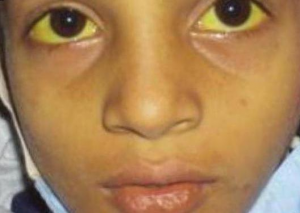 What is the disease?
What is the disease?
Hepatitis A is an infection of the liver that is caused by a virus. It is usually spread when a person eats or drinks something that is contaminated with the virus. A person who is sick may have a fever, diarrhea, dark urine, feel tired or nauseous, throw up, or have yellow skin or eyes.
Is the disease common?
The number of people who are infected with Hepatitis A has decreased by 95% since the vaccine was introduced in 1995. In 2016, there were about 4,000 cases of Hepatitis A in the United States. Many of these people were infected with the disease while they were traveling outside of the country.
Is the disease treatable?
There is no specific treatment for Hepatitis A. A person who is sick should rest, drink plenty of fluids, and take over-the-counter medications to reduce their fever.
Can the disease be deadly/dangerous?
Some people who get Hepatitis A and get very sick will need to go to the hospital.
Should I get the vaccine?
YES!
When is the vaccine given?
The Hepatitis A vaccine is normally given in 2 doses. The first dose is given between 12-23 months. The second dose is given 6 months after the first dose.
Does the vaccine work?
Yes, studies have shown that everyone who gets 2 doses of the vaccine is protected from the Hepatitis A virus.
What are the common side effects of the vaccine?
People who get the vaccine may feel soreness in the arm where they got the shot. Very few people reported getting headaches, loss of appetite, low-grade fever, or tiredness after they got the vaccine.
Is the vaccine safe?
YES!
Where can I get more information about the Hepatitis A vaccine?
 What is the disease?
What is the disease?
Hepatitis B is a virus that affects the liver. The virus can cause liver inflammation, liver disease, and liver cancer. If infected with Hepatitis B, symptoms may not show for many years. The virus is spread through direct blood contact or casual contact with blood or saliva (razors, toothbrush, etc.)
Is the disease common?
About 1 million people in the United States have Hepatitis B, and about 2,000 people die each year from the disease caused by the Hepatitis B virus.
Is the disease treatable?
There is no medication treatment for Hepatitis B. Doctors can provide antiviral medication and counseling to manage chronic disease symptoms. You can prevent getting the Hepatitis B virus by receiving the HepB vaccine.
Can the disease be deadly/dangerous?
Hepatitis B is transmitted very easily from person to person, and is 100 times more infectious than HIV. Even a small exposure to the virus can infect an individual who hasn’t been vaccinated. Liver cancer is the second leading cause of death worldwide, and half of the liver cancer cases are caused by the Hepatitis B virus. Except for the flu, Hepatitis B virus causes more severe death and disease than another vaccine-preventable disease.
Should I get the vaccine?
YES!
When is the vaccine given?
The Hepatitis B vaccine is given in 3 doses. 1 dose is given at birth, 2 months of age, and 6 months of age.
Does the vaccine work?
YES! The HepB vaccine is 95% effective for those who receive the complete 3 dose series.
What are the common side effects of the vaccine?
Common side effects include: pain and soreness around the injection site, low-grade fever.
Is the vaccine safe?
YES!
Where can I get more information about the Hepatitis B vaccine?
What is the disease?
Haemophilus influenzae type b is a bacteria that affects the lining of the brain and breadstream and causes infection. The bacteria can lead to meningitis, along with other conditions entering spinal fluid and the bloodstream. It is spread when an infected individual coughs or sneezes, releasing bacteria filled droplets into the air for others to inhale.
Is the disease common?
Before the vaccine, about 25,000 children per year in the United States were infected by the Haemophilus influenzae type b bacteria.
Is the disease treatable?
If diagnosed with a Haemophilus influenzae type b bacteria infection, antibiotics will be prescribed for treatment. For severe conditions associated with the bacteria, hospitalization may occur and children may require breathing support. You can prevent getting Haemophilus influenzae type b by receiving the Hib vaccine.
Can the disease be deadly/dangerous?
Haemophilus influenzae type b bacteria is a common cause of meningitis. Meningitis can lead to coma or death, and those who recover can be left with paralysis, deafness, blindness, and mental impairment. The bacteria can also cause bloodstream infection, pneumonia, swelling, skin infections, and epiglottis (suffocation).
Should I get the vaccine?
YES!
When is the vaccine given?
The Hib vaccine can be given in either 3 or 4 doses. 1 dose is given at 2 months, 4 months, 6 months (only for 4 dose series), and between 12-15 months.
Does the vaccine work?
YES! Due to the introduction of the Hib vaccine, less than 10 children have had Haemophilus influenzae type b per year.
What are the common side effects of the vaccine?
Common side effects include: pain and swelling at the injection site, and a low-grade fever.
Is the vaccine safe?
YES!
Where can I get more information about the Hib vaccine?
What is the disease?
Human papillomavirus (HPV) is a virus that affects the skin and genital areas of the body. It is the most common infection that is spread through sexual contact in the United States. Many people do not have any symptoms, but sometimes it can cause genital warts to form. While these infections often go away on their own, sometimes they can cause cancer.
Is the disease common?
Yes, HPV is so common that most men and women who have sex will get at least one HPV infection at some point in their lives. About 79 million Americans are infected with HPV. HPV causes about 33,700 cases of cancer every year.
Is the disease treatable?
This is no cure for HPV infection, but most infections with go away on their own within 2 years. There are treatments for cancers that are caused by HPV.
Can the disease be deadly/dangerous?
HPV infections for most people are not dangerous. For a small number of people, HPV infections will not go away on their own and may lead to particular types of cancer, specifically cervical cancer in women. About 4,000 people die every year from cervical cancer.
Should I get the vaccine?
YES!
When is the vaccine given?
The HPV vaccine can be given in 2 or 3 doses depending on when the first dose is given. It is recommended that vaccination begins at 11-12 years of age. Children who receive the vaccine before age 14 only need 2 doses and should receive the second dose 6-12 months after the first. Teens who don’t receive the vaccine until they are 15 years old or older should receive 3 doses. The second dose should be given 1-2 months after the first dose and the third dose should be given 6 months after the first dose.
Does the vaccine work?
Yes, studies have shown that all 3 HPV vaccines prevent the beginning stages of cervical cancer nearly 100% of the time. The vaccines have also been shown to be 89% effective in preventing genital warts in young men.
What are the common side effects of the vaccine?
There may be pain, redness, or swelling at the site where the shot was given. There is also a possibility of fainting so it is recommended that people remain seated for 15 minutes after getting the vaccine.
Is the vaccine safe?
YES! The vaccine has been thoroughly tested by the FDA and has been shown to be both safe and effective.
Where can I learn more about the HPV vaccine?
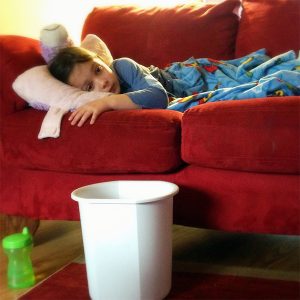 What is the disease?
What is the disease?
Flu is a contagious respiratory illness caused by influenza viruses that infect the nose, throat, and sometimes the lungs. It can cause mild to severe illness, and at times can lead to death.
Is the disease common?
Yes, a study conducted by the CDC found that about 8% of the U.S. population gets sick from flu each season, with a range of between 3% and 11%, depending on the season. Anyone can get flu (even healthy people), and serious problems related to flu can happen at any age, but some people are at high risk of developing serious flu-related complications if they get sick. This includes people 65 years and older, people of any age with certain chronic medical conditions (such as asthma, diabetes, or heart disease), pregnant women, and children younger than 5 years.
Is the disease treatable?
The first and most important step in preventing flu is to get a flu vaccine each year. Flu vaccine has been shown to reduce flu related illnesses and the risk of serious flu complications that can result in hospitalization or even death. CDC also recommends everyday preventive actions (like staying away from people who are sick, covering coughs and sneezes and frequent handwashing) to help slow the spread of germs that cause respiratory (nose, throat, and lungs) illnesses, like flu.
Can the disease be deadly/dangerous?
Yes, complications of flu can include bacterial pneumonia, ear infections, sinus infections and worsening of chronic medical conditions, such as congestive heart failure, asthma, or diabetes.
Should I get the vaccine?
Yes, A flu vaccine is the first and best way to reduce your chances of getting the flu and spreading it to others. CDC recommends that everyone 6 months of age and older receive a flu vaccine every year.
When is the vaccine given?
Children older than 6 months of age should get 1 flu vaccine every year.
Does the vaccine work?
Yes, the CDC conducts studies each year to determine how well the influenza (flu) vaccine protects against flu illness. While vaccine effectiveness (VE) can vary, recent studies show that flu vaccination reduces the risk of flu illness by between 40% and 60% among the overall population during seasons when most circulating flu viruses are well-matched to the flu vaccine.
What are the common side effects of the vaccine?
Like any medical product, vaccines can cause side effects. Side effects of the flu vaccine are generally mild and go away on their own within a few days.
Common side effects from the flu shot include:
- Soreness, redness, and/or swelling from the shot
- Headache
- Fever
- Nausea
- Muscle aches
The flu shot, like other injections, can occasionally cause fainting.
Is the vaccine safe?
Yes, Flu vaccines have a good safety record. Hundreds of millions of Americans have safely received flu vaccines over the past 50 years, and there has been extensive research supporting the safety of flu vaccines.
Where can I get more information about the influenza vaccine?
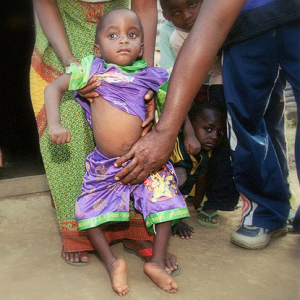 What is the disease?
What is the disease?
Polio, or poliomyelitis, is a crippling and potentially deadly infectious disease. It is caused by the poliovirus. The virus spreads from person to person and can invade an infected person’s brain and spinal cord, causing paralysis (can’t move parts of the body).
Is the disease common?
No, the United States has been polio-free for more than 30 years, but the disease still occurs in other parts of the world. It would only take one person with polio traveling from another country to bring polio back to the United States.
Is the disease treatable?
There is no cure for polio, it can only be prevented. Polio vaccine, given multiple times, can protect a child for life.
Can the disease be deadly/dangerous?
The risk of lifelong paralysis is very serious. Even children who seem to fully recover can develop new muscle pain, weakness, or paralysis as adults, 15 to 40 years later. About 2-10 children out of 100 who have paralysis from polio die because the virus affects the muscles that help them breathe.
Should I get the vaccine?
Yes, Polio vaccine protects children by preparing their bodies to fight the polio virus. Almost all children (99 children out of 100) who get all the recommended doses of vaccine will be protected from polio.There are two types of vaccine that can prevent polio: inactivated poliovirus vaccine (IPV) and oral poliovirus vaccine (OPV). Only IPV has been used in the United States since 2000; OPV is still used throughout much of the world.
When is the vaccine given?
The polio vaccine is normally given in 4 doses. 1 dose is given at 2 months, 4 months, between 6-18 months, and between 4-6 years.
Does the vaccine work?
Yes.
What are the common side effects of the vaccine?
Vaccines, like any medicine, can have side effects. Most children who get polio shots have no side effects. When side effects do occur, they are usually mild, like temporary redness and pain where the shot was given.
Is the vaccine safe?
Yes, the polio vaccine is very safe and effective at preventing polio.
Where can I get more information about the polio vaccine?
What is the disease?
Meningococcal bacteria can cause meningitis (infection of the covering of the brain and spinal cord). Children who have meningitis may have a stiff neck, fever, headache, nausea, or be more sensitive to light. These bacteria can also cause septicemia (infection of the bloodstream), as well as fever, fatigue, vomiting, chills, severe pain, diarrhea, or a dark purple rash. Meningococcal bacteria are spread from person to person through close contact, such as coughing, kissing, or sharing eating utensils.
Is the disease common?
No, this disease is rare. In 2016, 315 cases and 49 deaths were reported in the United States. This disease is most common in children less than 5 years old and between 16-21 years old.
Is the disease treatable?
Yes, meningococcal disease can be treated with antibiotics and it is important to start treatment early.
Can the disease be deadly/dangerous?
Yes, about 15% of people with the disease will die even with antibiotic treatment. 1 in 5 people who do recover from the disease will have serious health problems such as hearing loss, limb loss, or brain damage.
Should I get the vaccine?
YES!
When is the vaccine given?
The MenB vaccine is not recommended for all adolescents. It is only recommended for adolescents who may be at higher risk for infection, such as those who have a damaged spleen or problem with their immune system.
Does the vaccine work?
Yes, studies have shown that 63-88% of people who receive the full series of the MenB vaccine develop protective antibodies against the disease.
What are the common side effects of the vaccine?
The most common side effect is pain at the site where the shot is given that occurs in 80% of people who receive the vaccine.
Is the vaccine safe?
YES!
Where can I learn more about the Meningitis B vaccine?
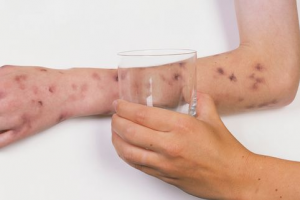 What is the disease?
What is the disease?
Meningococcal bacteria can cause meningitis (infection of the covering of the brain and spinal cord). Children who have meningitis may have a stiff neck, fever, headache, nausea, or be more sensitive to light. These bacteria can also cause septicemia (infection of the bloodstream) that cause a fever, fatigue, vomiting, chills, severe pain, diarrhea, or a dark purple rash. Meningococcal bacteria are spread from person to person through close contact, such as coughing, kissing, or sharing eating utensils. https://www.chroniclelive.co.uk/news/health/meningitis-tell-tale-signs-teenagers-11242753
Is the disease common?
No, this disease is rare. In 2016, 315 cases and 49 deaths were reported in the United States. This disease is most common in children less than 5 years old and between 16-21 years old.
Is the disease treatable?
Yes, meningococcal disease can be treated with antibiotics and it is important to start treatment early.
Can the disease be deadly/dangerous?
Yes, about 15% of people with the disease will die even with antibiotic treatment. 1 in 5 people who do recover from the disease will have serious health problems such as hearing loss, limb loss, or brain damage.
Should I get the vaccine?
YES!
When is the vaccine given?
The MenACWY vaccine is normally given in 2 doses. 1 dose is given at 11-12 years and 16 years of age.
Does the vaccine work?
Yes, studies have shown that MenACWY is at least 85% effective.
What are the common side effects of the vaccine?
About 50% of people who receive the MenACWY vaccine will have redness or pain where the shot was given. Very few people may develop a fever or have an allergic reaction.
Is the vaccine safe?
YES!
Where can I get more information about the Meningitis ACYW vaccine?
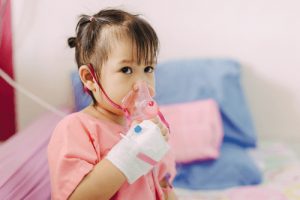 What is the disease?
What is the disease?
Pneumococcus is a bacteria that can cause several different types of infections in children, such as:
- Pneumonia (infection of the lungs)
- Meningitis (infection of the tissue covering the brain and spinal cord)
- Ear infections
- Infections of the bloodstream
The bacteria that cause these infections is spread from person to person by direct contact with saliva or mucus.
Is the disease common?
Some of the infections caused by pneumococcal bacteria are common, such as ear and sinus infections. However, the more severe forms of infection such as meningitis, pneumonia, and blood infections are more rare. Before the use of vaccine in the United States, pneumococcal bacteria caused 700 cases of meningitis, 13,000 blood infections, and 5 million ear infections every year in children under age 5.
Is the disease treatable?
Antibiotics are used to treat pneumococcal disease, but some types of these bacteria have become resstant to some antibiotics.
Can the disease be deadly/dangerous?
Yes, some of the infections caused by pneumococcal bacteria can be very serious or even deadly.
- 1 out of 15 children who get meningitis will die and others may have hearing loss or brain damage.
- 1 out of 100 children younger than 5 will die of a bloodstream infection.
- 1 out of 20 people will die of pneumonia.
Ear or sinus infections are usually mild and are not as serious as the other types of infections.
Should I get the vaccine?
YES!
When is the vaccine given?
The PCV13 vaccine is normally given in 4 doses. 1 dose is given at 2 months, 4 months, 6 months, and between 12-15 months of age.
Does the vaccine work?
Yes, PCV vaccine is 50-80% effective in preventing invasive disease, such as meningitis or pneumonia.
What are the common side effects of the vaccine?
Between 30-50% of people who receive the vaccine have redness or pain at the site where the shot was given. Less than 1 out of 100 people who receive the vaccine may have fever or muscle aches.
Is the vaccine safe?
YES!
Where can I get more information about the PCV vaccine?
- https://www.chop.edu/centers-programs/vaccine-education-center/vaccine-details/pneumococcal-vaccine
- https://www.cdc.gov/pneumococcal/about/index.html
- http://www.immunize.org/catg.d/p4213.pdf
What is the disease?
Rotavirus is a disease that affects the intestines. It is commonly noticed by the symptoms of high fever, stomach pain, severe vomiting, and diarrhea. This can then lead to loss of appetite and dehydration. The virus is spread through contact with contaminated surfaces and foods that have previously come in contact with the stool of an infected person.
Is the disease common?
Before the Rotavirus vaccine, 1 in 70 children (2.4 million) would be infected per year and might have required hospitalization in order to properly rehydrate and allow the virus to pass.
Is the disease treatable?
The Rotavirus does not have a medication treatment. Doctors can provide rehydration medication to children with severe dehydration due to the symptoms. You can prevent getting the Rotavirus by receiving the RV vaccine.
Can the disease be deadly/dangerous?
Rotavirus infection often requires hospitalization of the infected children to monitor the fever and rehydrate the body. Before the vaccine, the Rotavirus led to 55,000-70,000 hospital visits and 20-60 deaths per year.
Should I get the vaccine?
YES!
When is vaccine given?
The Rotavirus vaccine is normally given in 2 doses. 1 dose is given 2 months and 4 months of age. The vaccine is not recommended for children who do not receive their first dose by 14 weeks of age.
Does the vaccine work?
YES! 9 out of 10 children who receive the vaccine will be protected from severe Rotavirus symptoms. Since the vaccine has been widely used, there has been an 80% decrease in hospitalizations due to Rotavirus.
What are the common side effects of the vaccine?
Common side effects include: irritation, mild diarrhea, vomiting, and a low-grade fever. A rare side effect is a bowel blockage, seen in less than 1 in 100,000 children vaccinated.
Is the vaccine safe?
YES! Because it is a live vaccine, however, it should not be given to babies with severe immune deficiencies.
Where can I get more information about the Rotavirus vaccine?
https://www.cdc.gov/rotavirus/about/index.html
https://www.chop.edu/centers-programs/vaccine-education-center/vaccine-details/rotavirus-vaccine
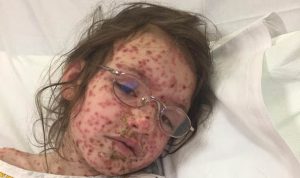 What is the disease?
What is the disease?
Chickenpox is caused by the varicella virus and is spread from close contact with another person who is sick, including coughing or sneezing. When a person gets sick, they get an itchy rash of about 200-500 blisters all over their body and may have a fever.
Is the disease common?
Before the vaccine was available in 1995, there were 4 million of cases of chickenpox every year. This number has dropped by 95% and today the disease is more rare.
Is the disease treatable?
Medical treatment is not usually recommended for children who get chickenpox between the ages of 1-12. These children who get sick should get plenty of rest, drink water, and may take over-the-counter medications if they have a fever. There are medications available that can help make the disease less severe if a person is at risk for more serious problems.
Can the disease be deadly/dangerous?
While many cases of chickenpox are not serious, there can be complications. Some people who get chickenpox may get pneumonia (infection of the lungs), encephalitis (infection of the brain), or infections in the skin. While it is rare, children can also die from the disease. Before the vaccine was widely used, about 100 children died from chickenpox infections each year.
Should I get the vaccine?
YES!
When is the vaccine given?
The varicella vaccine is normally given in 2 doses. 1 dose is given between 12-15 months and between 4-6 years of age.
Does the vaccine work?
Yes, the vaccine has been shown to be 99% effective when children get 2 doses.
What are the common side effects of the vaccine?
There may be redness, stiffness, or soreness at the site where the shot was given. Rarely, a person may get a mild rash around the site where the shot was given.
Is the vaccine safe?
YES!
Where can I get more information about the Varicella vaccine?



